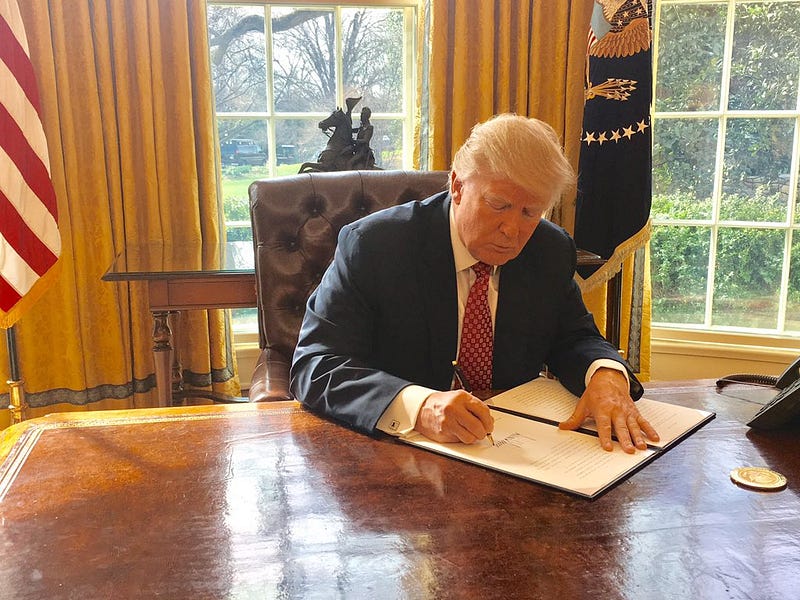
On Sunday, Sept. 24, the Trump administration unveiled what political pundits are calling “Travel Ban 3.0” — the most recent update to President Donald J. Trump’s controversial restrictions on foreign entry into the United States. This marks the second time that the original executive order, titled “Protecting the Nation from Foreign Terrorist Entry into the United States,” has been revised.
The ban was first signed on January 27 and banned citizens from Iraq, Syria, Iran, Libya, Somalia, Sudan and Yemen, majority-Muslim countries, from entering the country for 90 days. Mass protests broke out at airports across the nation the following day, and a number of lawsuits were filed against the order. Assistant Professor of Government Gbemende Johnson sheds some light on why the ban was so controversial, and why it remains so contentious today.
One of the primary concerns surrounding the ban is the First Amendment issue. “[Following] some of the language that Trump used in the campaign and in his tweet, it appears that the executive order is targeting those individuals not just from Muslim countries but perhaps who also identify or practicing Muslims,” Johnson said, referencing Trump’s 140-character declaration that the travel ban was needed for “certain DANGEROUS countries, not some politically correct term that won’t help our people.” One piece of evidence that travel ban critics cited were the original exemptions made for people considered persecuted religious minorities from the banned countries, which skeptics saw as a thinly-veiled excuse to allow Christians across the border.
Many also argued that the initial ban was too vague, affecting too many people–potentially millions–and that it seemed to include people who should have legally been allowed to enter the country with visas or permanent resident status.
In March, the Trump administration released a new executive order that superseded the original. Trump called this new order a “watered down, politically correct version” of the former one. It removed Iraq from the list of restricted countries and attempted to clarify who was banned and who was not, something that had been a source of confusion for both officials and citizens.
However, many plaintiffs seemed to disagree that the new ban was an acceptable improvement, as lawsuits persisted.
The most recent revision to the ban adds Chad, North Korea, and Venezuela to the list, although only certain government officials and their family members are banned in regards to Venezuela. This new order is also indefinite.
Antonia Ng ’18, President of the Liberty in North Korea organization at Hamilton College, theorizes that this newest update is a way for the Trump administration to potentially nullify some of the lawsuits against them.
“[It’s] just a way for [Trump] to justify his travel ban on a personal level, so that they can’t say it’s a religious ban,” Ng said. “To be honest, it’s not like we were having North Korean people come to the US as tourists.”
Johnson agrees. “If there was a deficiency in terms of a discriminatory intent, then some legal scholars have argued that adding these other countries, that’s not going to cure the original deficiency,” Johnson said.
Regardless of the administration’s motives, Ng believes that this ban is harmful not just for refugees, but also for American citizens.
“It’s very sad on the American side of it,” Ng said. “When [refugees] come, they attend TED Talks, they go to the UN, they share their stories. Losing their voice, we aren’t able to learn about the true North Korean experience firsthand.”
Ng also believes that the US may be playing into North Korea’s hands by adding them to the list of banned countries.
“What the US is doing right now by shutting them off is doing what North Korea portrays us as–as this devil that doesn’t want anything to do with them. So in some ways we’re not helping ourselves. We’re actually aligning ourselves with what North Korea wants us to be,” Ng said.
The stated goal of the executive order is to protect Americans from potential terror attacks and threats coming in from the countries listed. These banned countries, the Trump administration argues, are not doing a proficient job of screening those that would like to enter the United States. However, some political analysts argue that the ban will not achieve its intended goal. Johnson explained the thought process behind some of her contemporaries’ stance.
“One potential thought is that one effective way [to achieve the administration’s goal] is if you can maintain and cultivate diplomatic relationships with some of these countries. That increases the flow of communication and the likelihood that threats are uncovered and communicated.
That’s the importance of maintaining the relationships with these countries,” Gbemende said. “But if you issue a broad ban of individuals from entering the country, then of course that can strain those relationships. And closing the borders can negatively affect those diplomatic channels, which are so important for information sharing and detection of threats.”
Although many people in the Hamilton community may not be directly affected by the new update, Johnson agrees with President David Wippman’s statement last semester that “what affects one member of our community affects us all.”
The Hamilton College administration has yet to release a statement on the new update.

















